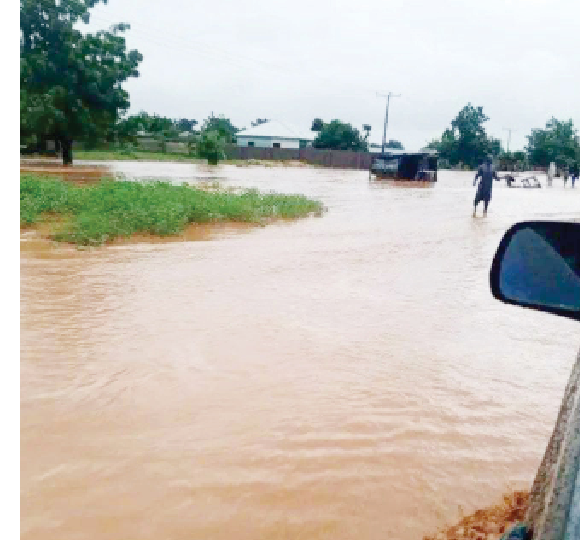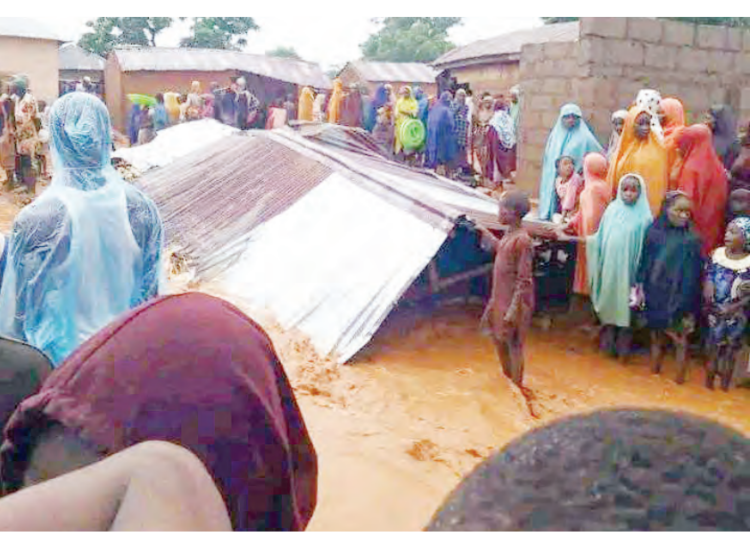Maryam Isma’il, a mother of five, woke to the sound of rushing flood water at night in July this year in Cheledi, an agrarian community in Kirfi local government area of Bauchi State. Her family scrambled to safety, leaving everything behind. Their home, a small mud-brick house, was no match for the flood.
They lost their treasured belongings; clothes and furniture are all gone. The family’s small farm was also destroyed; crops, nearing harvest, were washed away.
Maryam’s husband, a local trader, was hit hard. The flood destroyed his shop. With no home and no income, the family was left in despair.
“As soon as the flood hit, we sought refuge in a makeshift room in one of our brothers’ residence. The conditions there were harsh.
“My husband sleeps alone under a thatched tent. We live apart under this trying moment.
“The economic impact on us was severe. We have been living hand to mouth and had no savings to fall back on. We’re all struggling to survive,” she explained in a trembling voice.
Maryam’s story is just one among many among Cheledi flood victims. The flood has displaced dozens of families while the path to recovery appears to be long and uncertain.
 Similarly, a 35-year-old businessman, Umar Bala, who deals in building materials, suffered crippling losses as a result of the flood. His business was painfully wiped out by the floodwaters. “I lost N1.5 million in capital,” he said in a despairing voice.
Similarly, a 35-year-old businessman, Umar Bala, who deals in building materials, suffered crippling losses as a result of the flood. His business was painfully wiped out by the floodwaters. “I lost N1.5 million in capital,” he said in a despairing voice.
“Some people came to help me evacuate but they stole most of my goods instead,” Umar explained. The betrayal added to his already immense loss, leaving him with nothing to revive his business while feeding his family has become a daily struggle.
“We don’t know where our next meal will come from,” Umar said, with frustration evident in his voice. The loss of his business has plunged the family into deep uncertainty.
Aids coming to victims like Umar was minimal. “I was given about five measures of rice and 10 pieces of spaghetti,” Umar recalled. “But how can that be enough?” With two wives and nine children to care for, the small amount of aid was far from sufficient.
Both Maryam and Umar amplify the untold story of Cheledi flood victims whose conventional ways of living were completely ruined. Maryam’s struggle to protect her family and keep her marriage coupled with Umar’s loss of business and livelihood, epitomise the deep economic and emotional toll the flood has taken.
Also, their stories are not just personal tragedies; they represent the broader suffering of a community left to fend for itself with minimal aid, facing an uncertain future in the wake of flood disasters.
In July this year, flooding destroyed about 210 houses in Cheledi with families seeking shelter from public schools to makeshift rooms in a few unaffected houses in the community. Several hectares of farmlands were submerged and this is posing serious threats to food security in the area.
Similarly, data obtained from the State Emergency Management Agency (SEMA) in Bauchi shows that in 2023, flooding destroyed about 400 houses and 300 farms in Cheledi.
Auwal Cheledi who spoke with LEADERSHIP Weekend about the recurring floods in the area said, the overflowing of a local stream has been the main cause. “The dam was supposed to protect us,” Auwal said, “but it failed.”
Each time the flood occurs, it leaves behind a trail of destruction. Sand is deposited on farms and roads, making them difficult to use. The flooding has also caused severe gully erosion on farms.
“Our farmland is being eaten away. Cheledi is an agrarian community known for farming for generations but becoming a shadow of itself,” he lamented.
“Each time residents of Cheledi notice cloud formation, they become restless out of the fear of the unknown if it eventually rains,” he added.
Auwal urged the authorities in Bauchi to “relocate people away from the danger zone.”
He emphasized the need for a more permanent solution saying, “a standard dam needs to be constructed. Without it, the floods will continue to wreak havoc.”
Auwal’s call for action is clear. The community cannot continue to suffer from preventable disasters. It’s time for authorities to step in and make lasting changes.
Director of Relief and Rehabilitation, Bauchi State Emergency Management Agency (SEMA), Adamu Nayola, responded to the latest wave of flooding in Cheledi with urgent relief efforts.
He said the agency donated 50 bags of rice, 30 bags of maize as well as 50 blankets and 50 mats to the affected residents.
“We are doing what we can to help those in need,” Nayola said.
The flooding, according to SEMA, was caused by the silting of the local dam. The director pointed out that deforestation and the lack of cover grasses in the area have allowed water to flow freely, leading to the dam’s silting. “These environmental issues are contributing to the recurring floods,” he added.
He said that in the meantime, SEMA has continued to provide support to the flood victims stressing that the agency’s efforts are focused on both immediate relief and finding sustainable solutions to the problem.
SEMA highlighted that efforts were made two years ago to desilt the dam, but the problem has resurfaced demanding a permanent solution to perennial floods in Cheledi.
He revealed that plans are now underway to construct a new dam that can better withstand the environmental challenges. “We are looking at a long-term solution,” he explained. The agency is hopeful that this will prevent future flooding in Cheledi.





